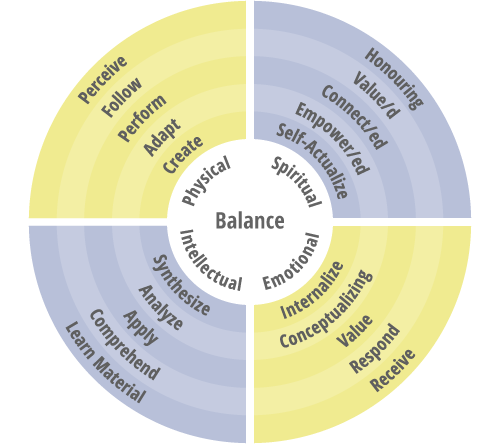Indigenizing Learning Outcomes
 LaFever has elaborated on the categorizations developed by Bloom and Fink to include a 4-quadrant model based on the Medicine Wheel, that includes the spiritual aspect of learning. By including the additional ‘spiritual domain,’ LaFever provides a model for indigenizing learning outcomes and course design.
LaFever has elaborated on the categorizations developed by Bloom and Fink to include a 4-quadrant model based on the Medicine Wheel, that includes the spiritual aspect of learning. By including the additional ‘spiritual domain,’ LaFever provides a model for indigenizing learning outcomes and course design.
The Spiritual Domain Includes:
- Honouring – refers to being conscious and aware of our own thoughts and feelings, without judging, and being open to new experiences
- Value/d – refers to relationship building that acknowledges the importance and worth of qualities relating to spiritual well-being
- Connect/ed – relates to developing a sense of group belonging (e.g., in the classroom, community etc.)
- Empower/d – relates to an giving and receiving support in an environment that fosters confidence and strength
- Self actualize/d – becoming who we are meant to be
Pros of LaFever
- spiritual domain is added to a taxonomy with which many people are already familiar (Bloom)
- is more inclusive for indigenous students and for diverse students in general
- invites us to reimagine how we teach and assess in ways that also support mental health and well-being
Cons of LaFever
- typical college modes of assessment do not lend themselves well to assessing the spiritual domain of learning
- more challenging for non-indigenous instructors to apply appropriately and without inadvertently reinforcing colonial approaches
- requires reinterpreting the roles of both the teacher and students (which may be easier in some areas than others)
Sample Verbs and Progression for Creating Outcome Statements
Honouring
- consider
- mediate on
- be aware
- seek
- allow
- listen
- observe
|
Value/d
- empathize
- honour
- acknowledge
- balance
- exemplify
|
Connect/ed
- consult
- work with
- support
- cooperate
- participate
- develop
|
Empower/ed
- gain
- speak out about
- advocate
- act on
- defend
- influence
|
Self-Actualize/d
- become
- self-define
- sustain
- possess
- dream
|
 |
Handouts:
|
 LaFever has elaborated on the categorizations developed by Bloom and Fink to include a 4-quadrant model based on the Medicine Wheel, that includes the spiritual aspect of learning. By including the additional ‘spiritual domain,’ LaFever provides a model for indigenizing learning outcomes and course design.
LaFever has elaborated on the categorizations developed by Bloom and Fink to include a 4-quadrant model based on the Medicine Wheel, that includes the spiritual aspect of learning. By including the additional ‘spiritual domain,’ LaFever provides a model for indigenizing learning outcomes and course design.